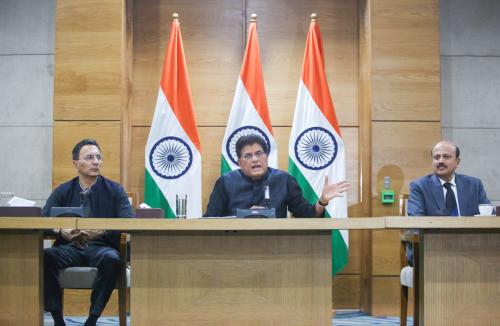A Letter From Grandpa
Niranjan Shah, a civil engineer, who pioneered famous high-rise buildings in Baroda, is a broadcaster in India and the USA and a prolific writer. Under “A Letter from Grandpa.” he has been writing since 2002 on India’s historical, philosophical, and literary heritage. He can be reached at nshah32@hotmail.com
By Niranjan Shah
My dear Snehi and Sohan:
Buddhaau sarnam Anvicha (Seek refuge in wisdom — Let intelligence be your sole quest) is the mantra from the Bhagavad-Gita (2:49) and the full verse is: Durena hyavaram karma buddhi yoga Dhananjaya | buddhau saranam anvicha krpanaha phala hetavaha.
The meaning of the verse is: “O Dhananjaya (Arjuna), work with desire or for result is indeed far inferior to that performed with the mind undisturbed by thoughts of results. Seek refuge in this evenness of mind. It is pitiable upon them, who think and act for results.”
The Bhagavad-Gita is at times referred to as the “manual for mankind” and has been highly praised by Aldous Huxley, Albert Einstein, J. Robert Oppenheimer, Ralph Waldo Emerson, Carl Jung and Herman Hesse. Lord Krishna narrated the Bhagavad-Gita more than 5,000 years ago. Aldous Huxley, an English novelist and essayist, born in a family that included some of the most distinguished members of the English ruling class, says: “The Bhagavad-Gita is the most systematic statement of spiritual evolution of endowing value to mankind. The Gita is one of the clearest and most comprehensive summaries of the spiritual thoughts ever to have been made.”
Wilhelm von Humboldt, Prussian Minister of Education and the founder of the science of linguistics, said about the Bhagavad-Gita: “The most beautiful, perhaps the only true philosophical song existing in any known tongue … perhaps the deepest and loftiest thing the world has to show.”
American philosopher Henry David Thoreau, transcendentalist, writes: “In the morning I bathe my intellect in the stupendous and cosmogonal philosophy of the Bhagavad-Gita, … in comparison with which our modern world and its literature seem puny and trivial; and I doubt if the philosophy is not to be referred to a previous state of existence, so remote is its sublimity from our conceptions.”
Even Lord Warren Hasting, English governor general, said: “I hesitate not to promote the Bhagavad-Gita, a performance of great originality, of sublimity of conception, reasoning and diction almost unequalled; and a single exception, amongst all the known religions of mankind.”
American author, lecturer, and philosopher Ralph Waldo Emerson wrote: “I owed a magnificent day to the Bhagavad-Gita Gait. It was as if an empire spoke to us, nothing small or unworthy, but large, severe, consistent, the voice of an old intelligence, which in another age and climate had pondered and thus disposed of the same questions which exercise us.”
Amour de Raincoat was a French author of several books including The American empire and The Soul of India. He asserts: “The Bhagavad-Gita is both supremely realistic and extremely idealistic, certainly the most acute, penetrating depiction of human nature and true morality.”
Regarding another Shloka 2.3 of the Bhagavad-Gita, Swami Vivekananda, says: “If one reads this one Shloka, one gets all the merits of reading the entire Gita; for in this one Shloka lies imbedded the whole message of the Gita.”
— Grandpa’s blessings












